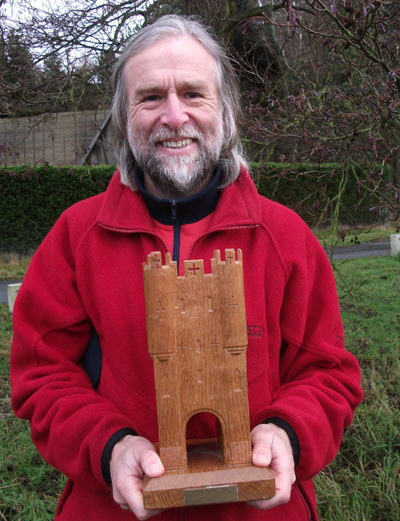A very old piece of oak
by: Steve Whitehead (pictured holding the trophy)
 I first made the England team in, I think, 2002. Of course we won the Veteran Home Internationals and I had a look at the unusual trophy – a carving of Micklegate Bar made from a single piece of oak salvaged after a fire in York Minster in the 60s.
I first made the England team in, I think, 2002. Of course we won the Veteran Home Internationals and I had a look at the unusual trophy – a carving of Micklegate Bar made from a single piece of oak salvaged after a fire in York Minster in the 60s.
Now I live less than a mile from Micklegate Bar (one of the gates in the medieval walls of the city) and so I was interested in the history of this trophy. Ten years later, I was given a copy of the programme for “Länderkampf 1971”. This was a joint venture by Eborienteers and York Youth Service and consisted of an international event between teams from England, Norway, Scotland, Wales, the USA, West Germany and Belgium.
The trophy was presented by the City of York in 1971 as this was the 1,900th anniversary of the foundation of the city by the Romans.
I guess at some point the Länderkampf ceased to exist and England retained the trophy and reallocated it once the Veteran Home Internationals started.
The 1971 programme make interesting reading. The first Länderkampf was held in Holland in 1969 and was intended to take place every two years. Competitors were “quartered” at York College of Education. The map was drawn in 5 colours according to international orienteering standards.
Friday saw a civic reception by the Lord Mayor. The first event was the following day with first start at 11.01 following a 60 minute coach journey. The same was promised for Sunday and teams departed Monday morning.
The results booklet shows that the late Gerry Goodridge was the organiser, Vic Roberts the start team leader. No surprise that Broxa Forest was “tough by virtue of the severity of its slopes, the density of the unbrashed trees and the choked nature of some of the rides, tracks and clearings.”
And look at the famous names, many still competing and their positions after the two days:
(England unless stated)
Senior Men
1. G. Peck 3 hours 17 minutes 56 seconds, Scotland
2. M. Wells-Cole
3. A Wale
4. R. Plumb
=5. B. Jamieson/M. Murray
8. P. Jagan, Wales
9. G. Wheeler
13. J. Thompson
15. M. Kelly
16. B. Gauld, Scotland
18. R. Wilkinson
19. R. West, Wales
20. J. Colls, Scotland
21. C. James
22. D. Griffiths, Wales
23. D. Wood, Scotland
24. G. Barnett, Scotland
26. M. White, Wales
27. S. Brook, Wales
39. B. Joiner, Wales
The last finisher representing the USA took 5 hours 55 minutes 59 seconds.
Senior Women
1. S. Harvey 2 hours 36 minutes 43 seconds
2. H. Hill
4. J.Tennant
5. F. Murray
6. C. Currie, Scotland
7. S. Rogers
8. S. Rex
12. C. Jamieson
13. D. Price, Scotland
14. D. Sheldon
15. B. Dixon, Wales
16. M. Brown, Scotland
17. C. Smith, Wales
Junior Men
1. O. Kreken 2 hours 55 minutes 49 seconds Norway
2. S. Roberts
4. J. Knight
6. D. Menzies, Scotland
7. A. Ligema, Wales
8. S. Easton, Scotland
9. R. Beard, Wales
10. G. Van Hee
11. D. Rosen
12. D. Cundall
13. N. Paul
Junior Women
1. L. V. Nielsen 2 hours 26 minutes 9 seconds Norway
3. A. Reed
4. J. Rook
5. S. Godderidge
6. S. King
7. L. Grant, Scotland
8. S. Potts
9. B. Turnball, Scotland
10. F. Jolly, Scotland
In those sexist times, the Micklegate Bar Trophy was won on the basis of the total times of the 4 best men and the 2 best women in each national team and England won ahead of Scotland, Germany and Wales though Norway would have come second had it not been for a disqualification:
(from the results booklet)
“There is little doubt that the severity of the fight areas led to the disqualifications for entering out-of-bounds areas. We were sorry to have to take such action with visiting runners. In each case protests were submitted by other competitors and the offence verified. It may be that in parts of the world better endowed with extensive forest little encroached upon by enclosed farmland it is not so necessary to take such a hard line. However it has to be made clear that here permission is often given for the use of the forest after the organiser has given an undertaking that participants will respect the privacy and fences of neighbouring farmers.”
Imagine that happening today – it would keep the Oblogs and twittersphere busy for weeks!
After the success of this event, it’s no surprise that EBOR went on to launch the White Rose the following year.